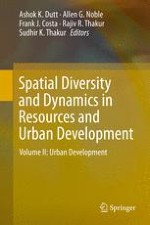2016 | OriginalPaper | Chapter
16. Mobility, Marginality, and the Cycle-Rickshaw in Indian Cities
Author : Gopa Samanta
Published in: Spatial Diversity and Dynamics in Resources and Urban Development
Publisher: Springer Netherlands
Activate our intelligent search to find suitable subject content or patents.
Select sections of text to find matching patents with Artificial Intelligence. powered by
Select sections of text to find additional relevant content using AI-assisted search. powered by
